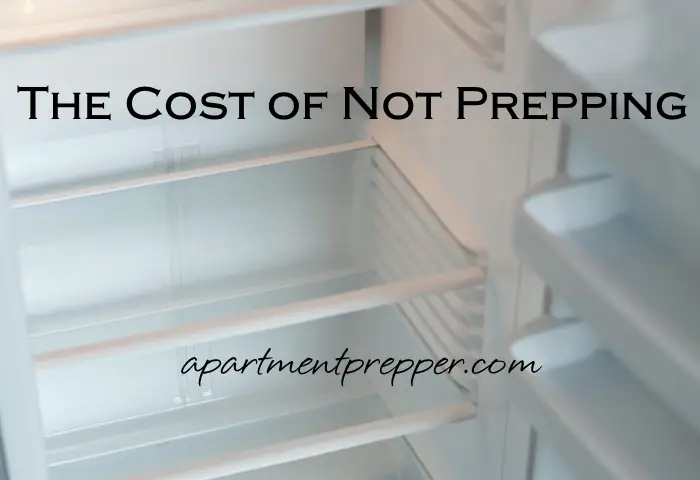This post is by Bernie Carr, apartmentprepper.com
Last month I mentioned my friend who got into debt – she has now put her prepping plans on hold, which is unfortunate. I am concerned there are lots of others out there who feel the need to prepare for emergencies but have convinced themselves to put it off for one reason or another. Let’s think it through and see if it would really cost less to NOT prep.
The true cost of not prepping
No emergency food in the house
We know a a few families who do not keep much food in the fridge – maybe a bottle of orange juice and a few bottles of beer. The kids feel lucky to have a few frozen food entrees, otherwise they eat out for every meal. The next time there is an emergency, these people expect to be able to run to the corner restaurant and demand to order. A cousin who runs a burger place says this happens all the time. If the restaurant loses power they have to close temporarily and turn away customers. The customers get frustrated they have to find someplace else to eat. So they drive around town looking for a place that’s open. Now they are wasting gas and time, not to mention risking their families driving out when streets are flooded. And, finding that there is no food to be bought anywhere, just like what happened with Hurricane Sandy, these same people may be forced to go dumpster diving.
No way to filter water
The same people described above rely on bottled water. But if the bottled water runs out, and tap water gets contaminated, they do not have any a way to filter water. Right before a hurricane or some other disaster hits, they realize they don’t have any backup plans and they find themselves having to fight desperate crowds to pick up water at the last minute.
Not filling up the gas tank until it’s empty
Let’s say someone who does not want to live a prepared life just lets the tank “run on fumes” One day that tank is just going to dry out, and the car will stall out. I see cars like that on the road all the time, with the driver walking with a gas can on hand. The engine could be permanently damaged and the car will need hundreds of dollars to repair. It would have been so much easier, had the driver kept a prepared mindset and got into the habit of refilling the tank well before before it registered empty.
No First Aid Kit
If a family does not keep a first aid kit at home, they will be running to the hospital’s emergency room the minute anyone in the family has a medical need, even a minor one. They may say, “I have health insurance, I can afford it.” But what about the co-pay? Let’s just look at a common plan: An emergency visit costs $100 co-pay; if they have met the deductible, that is. If not, they’d have to pay for the entire bill. Many ER visits can run up to $2000 depending on what diagnostic tests are run. Let’s hope they have an emergency fund.
No available cash for an emergency
But wait, the same non-prepper decided to put off saving for the emergency fund. He didn’t have the money to pay the ER bill so he put it on the credit card, thinking he can pay it off later. The visit cost $1500 and it all went to credit. Now the bank will charge interest on the $1500 at 18%, adding another $270 on top of the $1500. Now the debt that was so worrisome to begin with, got even larger. Additional debt causes sleepless nights, worry, and having to work longer hours at work. Not being prepared can affect mental health.
Even if there is no disaster or emergency, a simple power outage or bank glitch can cause bank ATMs, credit and debit cards to stop working. Having just a small emergency cash fund would help the family buy necessities without any issues.
These instances show the cost of not prepping is too high even for common emergencies – consider what might happen in a total grid down disaster. Seeing the family suffer from lack of food, water and other essentials would be intolerable.
Most of us pay property insurance, car and health insurance. I look at emergency food, water and supplies the same way: better to have it and not need it, than need it and not have it. I may be preaching to the choir here, but if just one person decides now is the time to take a few steps to be prepared instead of putting it off then I’d be happy to have helped someone.
Prepping may cost a bit of money and time up front, but NOT prepping would cost even more. And, the peace of mind that comes with being prepared is priceless.


You would think that during this day and age, anyone who witnessed Katrina or lived through Sandy, would automatically have ingrained in their minds to have much needed supplies on hand during a crisis. Sadly a lot of people still do not.
I’m pretty sure that merely “running out of gas” isn’t going to hurt a vehicle’s engine (based on my 20+ years as an auto mechanic).
However, that being said, I will state that consistently running less than 1/4 tank of fuel in a vehicle equipped with an electric fuel pump located inside the fuel tank itself – which is common on most vehicles on the road today – is NOT SMART. Such practices could (and probably will) lead to premature fuel pump failure … and replacing an in-tank fuel pump isn’t simple or inexpensive.
Hi Paul, Good info! Glad to hear from someone who knows. Thanks!